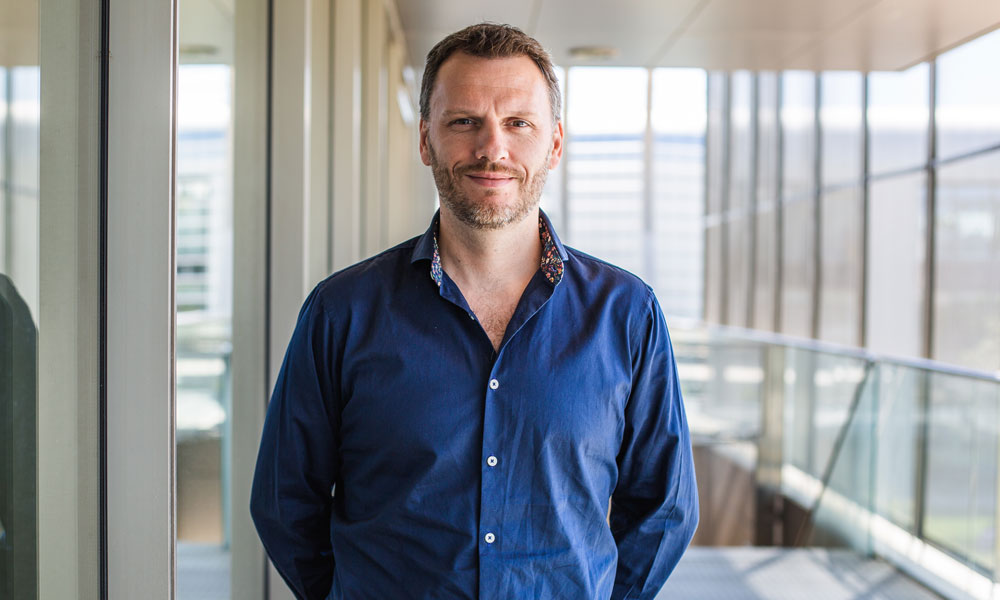
Molecules to Ecosystems: Rob Finn on the Microbial Ecosystems transversal theme
Rob Finn, one of the co-chairs of the Microbial Ecosystems theme, discusses his work, the challenges of multidisciplinary research, and how the theme is already helping to promote the exchange of scientific ideas

The Microbial Ecosystems theme – part of the new EMBL Programme ‘Molecules to Ecosystems’ – focuses on how microbes interact with and influence their environments. It aims to examine microbial functions, how microbes interact with each other as communities, and how they impact their surroundings. A fundamental goal of this theme is also to understand how we might be able to modulate the composition of a microbiome, either to enhance a particular trait or to return the microbiome to its original state after perturbation.
Rob Finn, Team Leader at EMBL’s European Bioinformatics Institute (EMBL-EBI), is one of the co-chairs for Microbial Ecosystems along with Nassos Typas, Group Leader at EMBL Heidelberg. Here, Rob discusses the challenges of multidisciplinary research, what this theme aims to accomplish in the coming years, and how it is already helping to promote the exchange of scientific ideas.
What is the Microbial Ecosystems theme and how does it build on EMBL’s present expertise?
When EMBL launched its new strategic programme ‘Molecules to Ecosystems’, Nassos Typas and I helped to develop and chair the Microbial Ecosystems theme. The work across EMBL that sits within this theme has an overarching aim to better understand the functional role of microbes within different ecosystems, particularly the human microbiome.
EMBL is already in a fantastic position to lay the foundation of this theme with a wide range of microbial research already going on. Researchers across EMBL are investigating microbial communities and their interactions by better understanding microbial diversity through genomics. In order to facilitate this at EMBL, we are establishing comprehensive databases and computational resources, developing new experimental resources and pipelines, and using the bioinformatic and structural biology expertise at EMBL to map microbial gene function, protein complexes, and functional pathways.
What are you working on in the Microbial Ecosystems theme?
The microbiome research that encompasses this transversal theme involves the study of all genomes present within different environments. My team help to develop and run EMBL-EBI’s MGnify data resource which allows users to submit, analyse, and compare thousands of microbiome datasets. We are currently working to expand MGnify to incorporate more genomes in our catalogues, as well as developing pipelines for the discovery and presentation of eukaryotic and viral members of microbiomes.
While we are focusing on human microbiomes initially in the theme, we are also expanding our datasets to cover marine biomes, in preparation for EMBL’s flagship project, the TREC expedition, which will sample organisms at the land-sea interface around European coastlines. This is alongside other ongoing projects, including Mission Microbiomes and AtlantECO, as well as scoping other potential new projects.
Research across EMBL is already contributing to this effort of characterising and analysing diverse microbial ecosystems, archiving these data and making it openly available around the world. Examples of this include the Skin Microbial Genome Collection (SMGC) which contains the genomes of microorganisms detected within 594 samples taken from various skin surfaces. Also the Global Microbial Gene Catalog that includes more than 2 billion genes, identified from samples collected from 14 different environments.
As a result of the EMBL Programme, what do you expect to be doing differently in 12 months?
This new forum facilitated by the Microbial Ecosystems transversal theme allows exchange of scientific ideas and needs. I expect to be incorporating experimental data from other EMBL groups and collaborators far more than ever before, as well as providing them with data and functional predictions for experimental validation.
In light of the discussions that took place at the 2021 COP26 summit, we need to also remember that having a better understanding of the microbial ecosystems around us can also help us better prepare for other global challenges such as climate change. The research that we are conducting now and the data we are collecting will help further down the line to unpick how microbial communities can evolve very quickly and adapt to climate change. How we harness this information could greatly support climate change research and help identify ‘nature based solutions’.
This is an exciting Programme but it also moves into new areas – what do you see as the main challenges of this?
Having a Programme which incorporates different disciplines, including ecology, marine biology, engineering, and mathematical theory, to name a few, means that we will have new audiences to engage and learn from. This is fantastic for expanding the scope of our research and providing innovative solutions to biological questions. However, this also means that we need to inform researchers from other disciplines about what EMBL is and does in the field of molecular biology, to build collaborations and new opportunities.
The EMBL-HZI Postdoctoral Fellowship Programme is a great example of building these collaborations which exist as part of the Microbial Ecosystems theme. Researchers at both EMBL and the Helmholtz Centre for Infection Research (HZI) will have the opportunity to combine their expertise in genetics, molecular and cell biology, multi-omics approaches, bioinformatics, modelling and much more to advance their research into the human microbiome.
What’s the best advice you were ever given in pursuing your field?
Science is always complex, so try and make everything you do simple and those simple pieces will come together to solve the complex problems.
Find out more
Learn more about the new EMBL Molecules to Ecosystems Programme and the Microbial Ecosystems theme.


